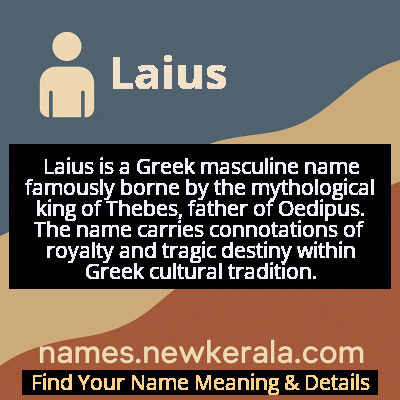Laius Name Meaning & Details
Origin, Popularity, Numerology Analysis & Name Meaning of Laius
Discover the origin, meaning, and cultural significance of the name LAIUS. Delve into its historical roots and explore the lasting impact it has had on communities and traditions.
Name
Laius
Gender
Male
Origin
Greek
Lucky Number
8
Meaning of the Name - Laius
Laius is a Greek masculine name famously borne by the mythological king of Thebes, father of Oedipus. The name carries connotations of royalty and tragic destiny within Greek cultural tradition.
Laius - Complete Numerology Analysis
Your Numerology Number
Based on Pythagorean Numerology System
Ruling Planet
Saturn
Positive Nature
Ambitious, efficient, realistic, and authoritative.
Negative Traits
Materialistic, stressed, confrontational, and can be overly ambitious.
Lucky Colours
Dark blue, black.
Lucky Days
Saturday.
Lucky Stones
Blue sapphire, amethyst.
Harmony Numbers
2, 4, 6.
Best Suited Professions
Business leaders, managers, financial services, law enforcement.
What People Like About You
Leadership, determination, organizational skills.
Famous People Named Laius
Laius of Thebes
Mythological King
Father of Oedipus and central figure in the Theban cycle of myths
Laius (historical)
Ancient Greek Noble
Minor historical figure mentioned in some ancient Greek records
Laius Papadopoulos
Academic
Greek scholar known for work in classical studies
Name Variations & International Equivalents
Click on blue names to explore their detailed meanings. Gray names with will be available soon.
Cultural & Historical Significance
The name Laius has become synonymous with paternal failure and the dangers of attempting to circumvent destiny. In psychoanalytic theory, particularly Freudian psychology, the 'Laius complex' refers to a father's hostile feelings toward his son, representing the paternal counterpart to the more famous Oedipus complex. This mythological legacy has influenced Western literature, psychology, and philosophy for centuries, making Laius a enduring symbol of tragic irony and the unintended consequences of human actions against divine will.
Extended Personality Analysis
Individuals named Laius are often perceived as possessing a complex blend of regal authority and tragic vulnerability. They tend to exhibit strong leadership qualities, determination, and a sense of destiny, but may also struggle with anxiety about future outcomes and a tendency toward controlling behavior. The mythological association suggests someone who is ambitious and protective of their legacy, yet potentially prone to making fateful decisions based on fear or prophecy rather than rational consideration.
Psychologically, the name carries connotations of paternal responsibility and the weight of generational legacy. Those named Laius might display a deep concern for family honor and tradition, combined with a philosophical awareness of life's ironies. They often possess strategic thinking abilities but may sometimes overthink situations, leading to paradoxical outcomes. The name suggests a personality that is both powerful and vulnerable—capable of great authority yet susceptible to the very circumstances they seek to control, embodying the ancient Greek understanding of hubris and its consequences.
Modern Usage & Popularity
In contemporary times, Laius remains an exceptionally rare given name, primarily used by classical scholars, mythology enthusiasts, or Greek families seeking to honor their heritage. The name's strong association with tragedy and paternal failure in the Oedipus myth has limited its widespread adoption. It occasionally appears in academic circles or among families with particular interest in classical studies. The name has never ranked in popular baby name lists in English-speaking countries and maintains a niche, intellectual appeal rather than mainstream popularity. Its usage is mostly confined to Greece and among diaspora communities where classical names are valued for their cultural significance.
Symbolic & Spiritual Meanings
Laius symbolizes the tragic irony of fate and the futility of attempting to escape destiny. He represents the archetype of the flawed patriarch whose actions, intended to prevent catastrophe, instead ensure its occurrence. The name carries symbolic weight as a cautionary tale about hubris, prophecy, and the unintended consequences of human intervention in cosmic order. Metaphorically, Laius embodies the concept that our attempts to control fate often create the very circumstances we fear most. He stands as a permanent symbol of paternal anxiety, generational conflict, and the complex relationship between free will and predestination that has fascinated philosophers and psychologists for millennia.

